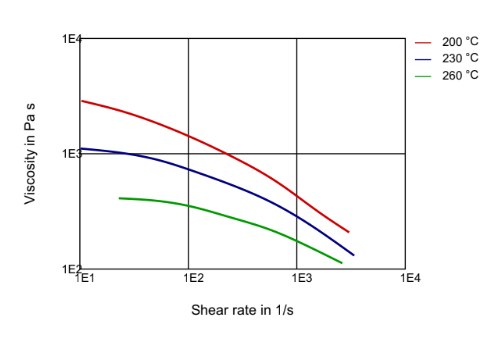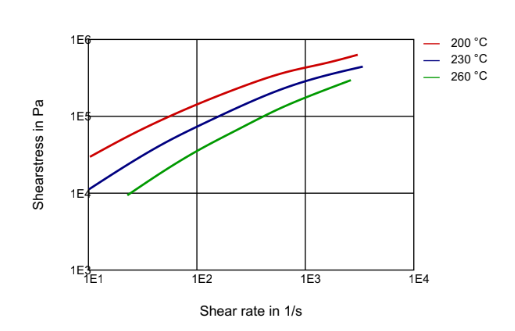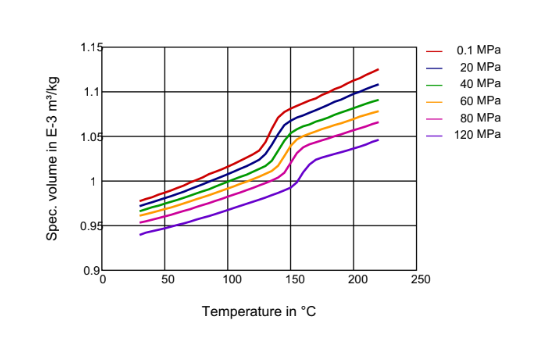Enhanced TDS
Identification & Functionality
- Additives Included
- Blend
- Yes
- Chemical Family
- Polymer Name
- Product Code
- MITM01785
- Single Ingredient
- No
- Technologies
- Product Families
Features & Benefits
- Materials Features
Applications & Uses
- Plastics & Elastomers End Uses
- Plastics & Elastomers Processing Methods
- Processing Information
- Typical melt temperature (Min / Recommended / Max) : 230°C / 260°C / 290°C.
- Typical mold temperature : 25 – 60°C.
- Drying time and temperature (only necessary for bags opened for more than two hours) : 5-7 hours at 70-80°C.
- Product Applications
- Athletic foot wear components
- Ski shoes
- Zip fasteners
- Hook and loop fasteners
- Processing Information
- Injection Molding
- Film Extrusion
- Profile Extrusion
- Extrusion
- Transfer Molding
- Casting
- Thermoforming
Properties
Technical Details & Test Data
- Technical Data
Viscosity-shear Rate

Shearstress-shear Rate

Specific Volume-temperature (PVT)

Packaging & Availability
- Packaging Type
Principal Information
- Group Principal Number
- S000003
- Principal
Other
- Color (SDS)
- Colorless to slightly yellow
- Insoluble in (SDS)
- Water
- Item Number
- Odor (SDS)
- Odorless
- Other Hazards
- Processing may release vapors and/or fumes which cause eye, skin and respiratory tract irritation, The product, in the form supplied, is not anticipated to produce significant adverse human health effects. Contains high molecular weight polymer(s). Effects due to processing releases: Irritating to eyes, respiratory system and skin, Prolonged or repeated exposure may cause: headache, drowsiness, nausea, weakness, (severity of effects depends on extent of exposure).
- Temperature Control
- Yes
- USA/DOT UN Number
- Not Applicable
- Electrical Properties
Value Units Test Method / Conditions Comparative Tracking Index 600.0 - IEC 60112 condensed Dielectric Constant 7.0 - IEC 60250 at 100 Hz, dry Dielectric Constant 4.0 - IEC 60250 at 1MHz, dry Dielectric Strength 44.5 kV/mm kV/mm IEC 60243-1 dry basis Dissipation Factor 0.163 tan δ tan δ IEC 60250 1MHz, dry Dissipation Factor 0.0586 tan δ tan δ IEC 60250 at 100 Hz, dry Surface Resistance 184000000000000.0 Ω Ω IEC 60093 condensed Volume Resistivity 800000000000.0 Ω-cm Ω-cm IEC 60093 1MHz, dry - Mechanical Properties
Value Units Test Method / Conditions Charpy Impact Strength 15.0 - ISO 179-1EA at 23°C, condensed, notched Charpy Impact Strength 10.0 - ISO 179-1EA at -30°C, condensed, notched Hardness 25.0 - Hardness 25.0 - ISO 868 Nominal Strain at Break min. 50.0 - ISO 527-2 condensed, at break, nominal Strain at Break min. 300.0 - ISO 527-1 dry, thermoplastic elastomer, at break Strain at Yield 18.0 - ISO 527-2 condensed Stress 6.0 MPa MPa ISO 527-1 dry, at 100% elongation Stress 2.0 MPa MPa ISO 527-1 dry, at 10% elongation Stress at Break 56.0 MPa MPa ISO 527-1 dry, thermoplastic elastomer, at break Stress at Yield 26.0 MPa MPa ISO 527-2 condensed, at yield Tear Strength 50.0 kN/m kN/m ISO 34-1 dry basis Tensile Modulus 19.0 MPa MPa ISO 527-1 dry basis Volume Loss 64.0 mm³ mm³ ISO 4649 Dry, Abrasion Resistance - Physical Properties
Value Units Test Method / Conditions Density 1010.0 - ISO 1183 condensed Density 1010.0 - ISO 1183 dry basis Humidity Absorption 0.7 % % ISO 62 dry basis Load/Unload Temperature 106.0 °C °C ISO 75-1 at 0.45 MPa, dry, deflection under load Melting Point 174.0 °C °C ISO 11357-1 at 10°C/min Mold Shrinkage 0.8 - ISO 2577 normal, dry Mold Shrinkage 0.5 - ISO 2577 parallel, dry Mold Shrinkage 0.8 - ISO 294-4 normal, dry Mold Shrinkage 0.5 - ISO 294-4 parallel, dry Softening Point 164.0 °C °C ISO 306 at 50°C/h, 50N, dry Storage Temperature max. 140.0 °F °F Water Absorption 0.9 % % ISO 62 dry basis - SDS Physical and Chemical Properties
Value Units Test Method / Conditions Autoignition Temperature (SDS) 698.0-842.0 °F °F Bulk Density (SDS) 550.0-650.0 - Decomposition Temperature (SDS) 572.0-662.0 °F °F Density (SDS) 1.01 g/cm³ g/cm³ Melting Point (SDS) 345.0 °F °F Specific Gravity (SDS) 1.01 - Water = 1, liquid - Shelf Life & Stability
Value Units Test Method / Conditions Shelf Life 2.0 - - Thermal Properties
Value Units Test Method / Conditions Coefficient of Thermal Expansion 0.00012 /K /K ISO 11359-1 parallel, dry
